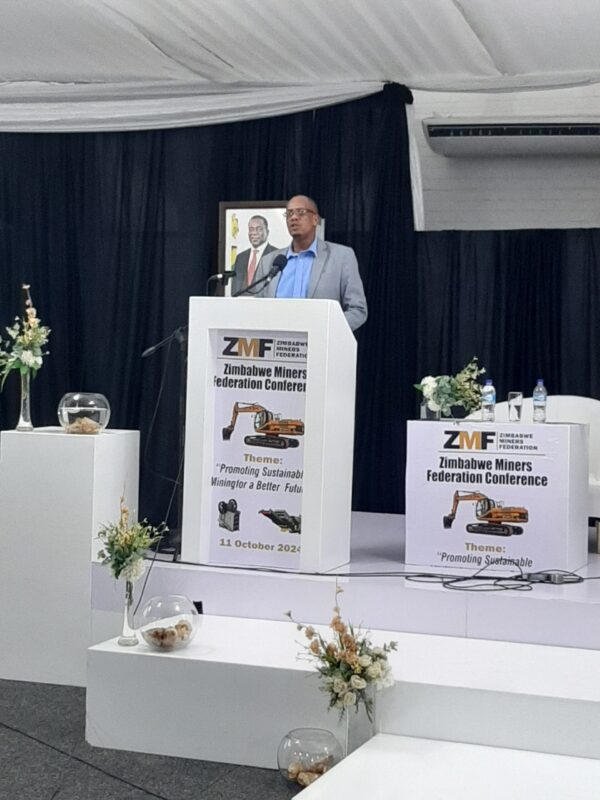The Reserve Bank of Zimbabwe’s Financial Intelligence Unit (FIU) has urged Small-scale miners in Zimbabwe to prioritize compliance with anti-money laundering regulations to safeguard the industry’s future and avoid the greylisting of the country’s Refineries.
By Ryan Chigoche
The RBZ emphasized that non-compliance could result in the country being placed on a grey list—a designation that would complicate financial transactions, hinder foreign investment, and negatively impact the vital mining sector. This warning comes at a crucial time when the mining industry is increasingly scrutinized for its vulnerability to illicit financial activities.
The small-scale mining sector plays a significant role in Zimbabwe’s economy, contributing to employment and export revenues. However, its informal nature and lack of regulation make it susceptible to practices that can undermine its legitimacy and stability. As global standards for financial transparency tighten, the pressure on these miners to comply with anti-money laundering measures has intensified.
Speaking at the Zimbabwe Miners Federation (ZMF) small-scale miners conference, held on the sidelines of Mine Entra 2024, RBZ FIU official Nkosilathi Mpofu addressed these concerns, highlighting the urgency of the situation:
“We are encouraging you, as the dealers, to work closely with the auditors when they come to request certain measures or information. You must cooperate with them. The failure of Fidelity Gold Refinery, the exporters of metals, to meet specific obligations laid out in anti-money laundering regulations may lead to greylisting. Being greylisted presents many challenges and disadvantages,” Mpofu said.
Mpofu’s statement underscores the importance of compliance with anti-money laundering regulations for small-scale miners in Zimbabwe. He warned that failure to comply could result in the country being placed on a grey list, with negative consequences for the mining sector.
Money laundering is a pervasive issue in many industries worldwide, and the small-scale mining sector in Zimbabwe is no exception. The Financial Action Task Force (FATF) has long recognized the vulnerabilities in various sectors that facilitate the movement of illicit funds. In Zimbabwe, the small-scale mining industry presents unique challenges and opportunities for money laundering, which can have serious implications for both the economy and governance.
In the small-scale mining sector, money laundering typically involves concealing the origins of illegally obtained funds through a series of transactions that make them appear legitimate. Miners often manipulate sales figures to create discrepancies that obscure the true nature of their financial activities. For instance, they may exaggerate sales to justify large deposits in banking systems or under-report earnings to evade taxes, creating an environment ripe for illicit financial flows.
Another common tactic involves establishing shell companies, which allow individuals to disguise the source of their funds by generating fake invoices and documentation to create the illusion of legitimate transactions. Cash transactions are prevalent in small-scale mining, as they facilitate anonymity and complicate tracing efforts. Large volumes of cash exchanged can easily evade detection, further complicating regulatory oversight.
Additionally, miners sometimes engage in inflated pricing for equipment purchased from related entities, using this practice to launder money by creating legitimate business expenses that mask the true origins of funds. Layering transactions through multiple accounts or jurisdictions is another method employed to obscure the money trail. Informal banking systems and cryptocurrencies are often used in this process, making it increasingly difficult for authorities to trace illicit funds.
Investment in local community projects is another way miners present themselves as legitimate operators. By engaging in community development initiatives, they can further obscure the sources of their funds, creating a façade of legitimacy. Corruption exacerbates these challenges, as collusion between miners and government officials can facilitate illicit activities without consequence, undermining enforcement efforts.
The FATF, an intergovernmental organization focused on combating money laundering and terrorist financing, provides a framework for countries to implement effective measures against these activities. Central to the FATF’s approach is the promotion of a risk-based methodology, which emphasizes identifying high-risk areas within the small-scale mining sector. By focusing on these areas, authorities can implement targeted measures to mitigate risks.
Moreover, the FATF stresses the need for robust due diligence procedures to verify the legitimacy of business operations. This requirement is particularly relevant in Zimbabwe’s small-scale mining context, where ensuring that miners are not operating as fronts for money laundering is crucial. Effective collaboration between the mining sector and law enforcement agencies is also essential. The FATF advocates for increased information sharing and cooperation to detect and prevent money laundering activities.
For the small-scale mining sector to thrive and comply with FATF regulations, it is critical that miners adhere to established guidelines. Compliance not only protects individual operations but also safeguards the reputation of key buyers like Fidelity Gold Refinery, the sole buyer of gold in Zimbabwe. If the small-scale mining sector is perceived as high-risk due to rampant money laundering, there is a risk that Fidelity could be greylisted, which would severely hinder operations, limit engagement in international markets, and attract scrutiny from regulatory bodies.
To strengthen its anti-money laundering framework, experts argue that Zimbabwe must develop and enforce regulations that align with FATF standards. Establishing clear guidelines for financial transactions within the mining sector can significantly reduce opportunities for money laundering. Additionally, raising awareness and providing training for miners and financial institutions regarding the risks and consequences of money laundering will foster a culture of compliance with anti-money laundering regulations.
Currently, Zimbabwe is one of the most compliant nations in the region, with a rating of 36 out of 40 FATF recommendations, and it aims to achieve a perfect score of 40 out of 40 by next year.




